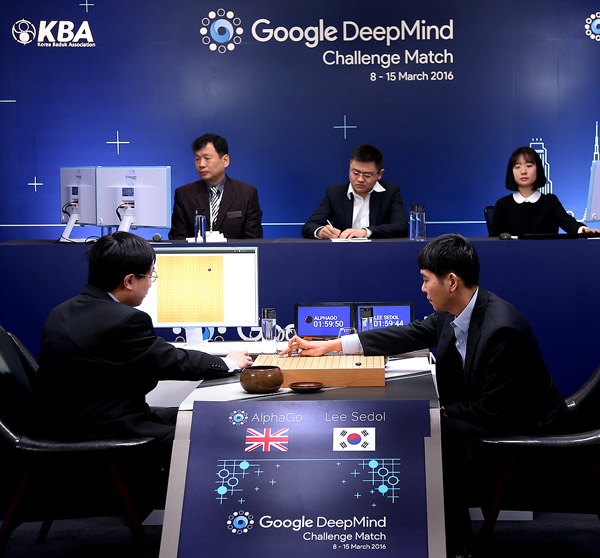

 |
SEOUL-- AlphaGo, the computer created by DeepMind, the Artificial Intelligence (AI) arm of Google, established a commanding three consecutive victories over South Korea's grandmaster Lee Sedol, winning the best-of-five human vs. machine Go-chess showdown on Satursday.
World champion Lee, one of the top players of the ancient Chinese board game, lost the Game 3 in a similar pattern, having to resign half way when it became clear the AlphaGo had taken an unassailable lead like the preceding two encounters.
The chance for Lee to win one game in remaining two matches as he aimed to after Game 2 now seems quite slim. The progress of AI technology is proved far beyond expectations ahead of the human vs. machine match-up as most experts had predicted that Lee will be the overall winner inlcuding former Google Vice President Kai-Fu Lee, who had assumed AlphaGo could not defeat Lee in their first face-off.
The scenario has never come up to Lee's imagination either. As a great Go player, who has topped the world ranking for much of the past decade, Lee confidently predicted an easy victory when accepting the AlphaGo challenge, but now finds himself fighting to avoid a whitewash defeat in the two remaining games on Sunday and Tuesday.
"AlphaGo played consistently from beginning to the end while Lee, as he is only human, showed some mental vulnerability," said one of Lee's former coaches, Kwon Kap-Yong.
"The machine was increasingly gaining the upper hand as the series progressed," Kwon said.
The most famous AI victory to date came in 1997 when the IBM-developed supercomputer Deep Blue beat Garry Kasparov, the then-world class chess champion, in its second attempt.
But a true mastery of Go, which has more possible move configurations than there are atoms in the universe, had long been considered the exclusive province of humans -- until now.
AlphaGo's consecutive victories in the mind game is a breakthrough for AI, showing the program has mastered one of the most creative and complex games ever devised.
AI experts had forecast it would take another decade for computers to beat professional Go players. That changed when AlphaGo defeated the European Go champion Fan Hui last year in a 5-0 whitewash, in a closed-door match later published in the journal Nature. Since then, AlphaGo's performance has steadily improved.
AlphaGo's successive wins over a human champion shows computers can mimic intuition and tackle more complex tasks, its creators say. They believe that ability could be used to help scientists solve tough real-world problems in health care and other areas.
 Beautiful Kapok flowers bloom in Hainan
Beautiful Kapok flowers bloom in Hainan Eye-catching beauties in Chunxi Road of Chengdu
Eye-catching beauties in Chunxi Road of Chengdu Wedding pictures of Wu Qilong, Liu Shishi released
Wedding pictures of Wu Qilong, Liu Shishi released One of world's largest military drills in Saudi Arabia
One of world's largest military drills in Saudi Arabia Iron lady or goddess? Sportswomen's dress show
Iron lady or goddess? Sportswomen's dress show Versatile female soldiers in military camp
Versatile female soldiers in military camp Top beauties in Chinese provinces
Top beauties in Chinese provinces Follow me to my Weibo
Follow me to my Weibo Chinese ships keep close watch on U.S. Navy aircraft carrier strike group in S. China Sea
Chinese ships keep close watch on U.S. Navy aircraft carrier strike group in S. China Sea Top 20 hottest women in the world in 2014
Top 20 hottest women in the world in 2014 Top 10 hardest languages to learn
Top 10 hardest languages to learn 10 Chinese female stars with most beautiful faces
10 Chinese female stars with most beautiful faces China’s Top 10 Unique Bridges, Highways and Roads
China’s Top 10 Unique Bridges, Highways and Roads How prosperous is the city Beijing really?
How prosperous is the city Beijing really?  China will further open market for foreign firms this year: report
China will further open market for foreign firms this year: report  Influenced by Ai Weiwei, a remote village evolves into a lab for performance artists
Influenced by Ai Weiwei, a remote village evolves into a lab for performance artists  Western speech freedom not fit for China
Western speech freedom not fit for China Day|Week